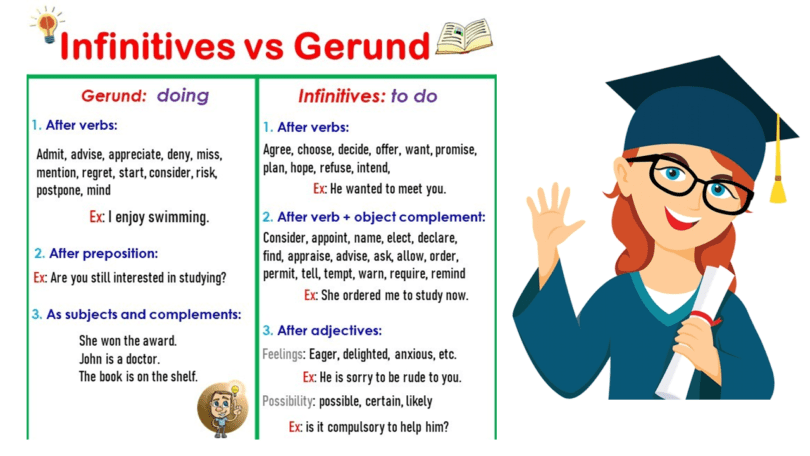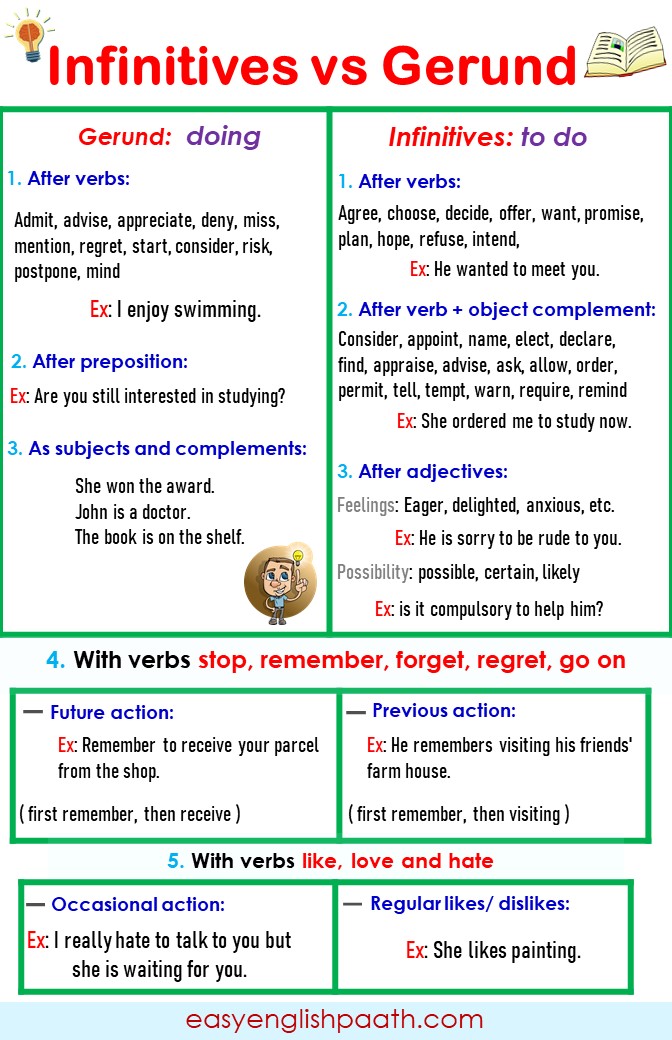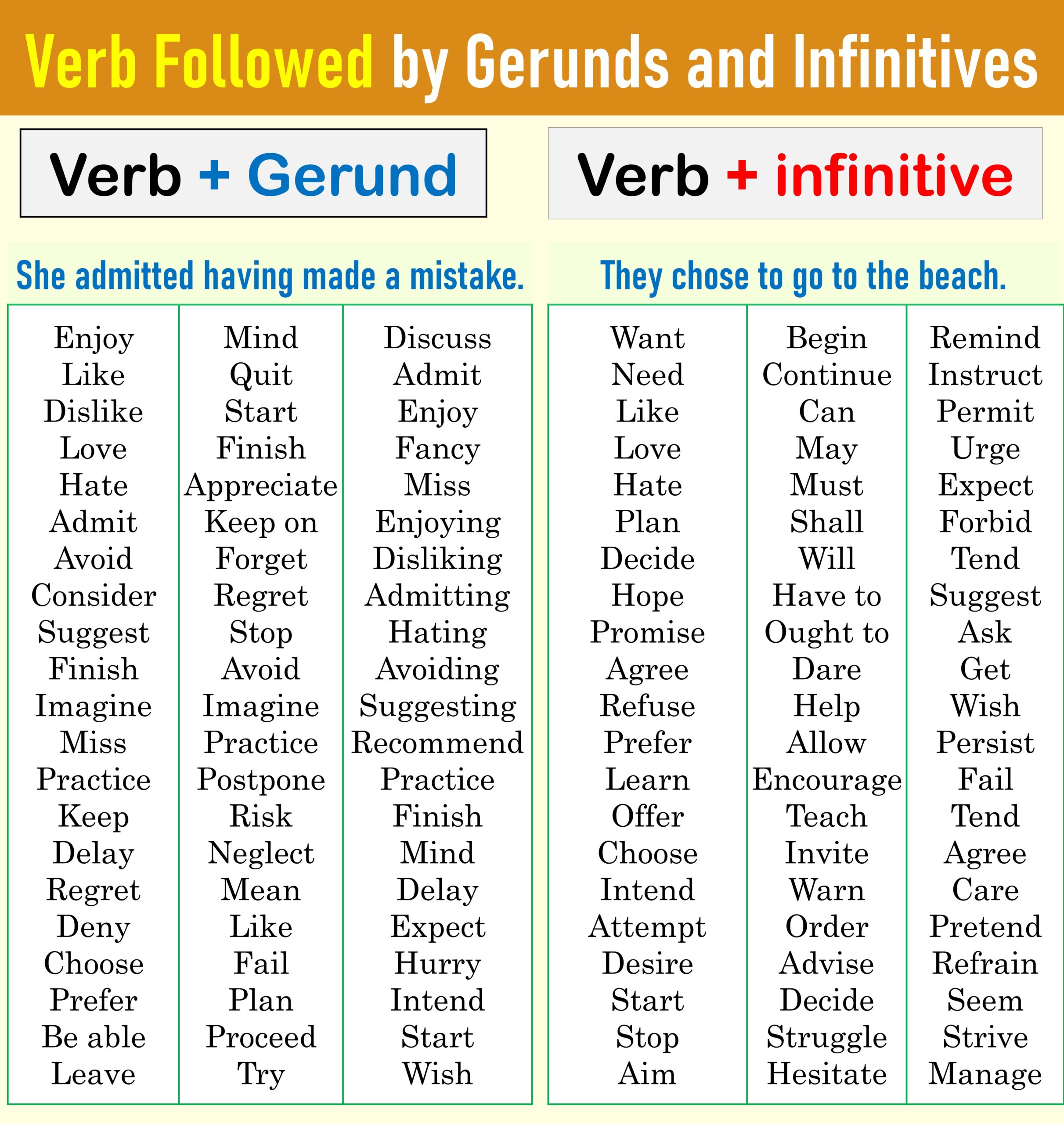Gerunds vs. Infinitives: Essential English Grammar Rules

Gerunds are verbs that act like nouns, and end in ‘ing’ like swimming or reading They are used to express actions as things. While infinitives, on the other hand, are the base form of a verb, they often go before ‘to’ like to swim or to read. They can act as nouns, adjectives, or adverbs in Sentences. Learning how to use gerunds and infinitives correctly can notably improve your English skills.

Gerunds vs. Infinitives: Essential English Grammar Rules
What Are Gerunds and Infinitives?
First thing, we need to learn that what are gerunds and infinitives? These are verb forms that don’t act like regular verbs in sentences. They often take on roles as nouns, adjectives, or adverbs. Here’s a simple explanation that can help you learn more about them.
- Gerunds:
These are verbs that end in -ing Running, Swimming. They work as nouns, and are used to indicate an action or an activity. For example, i love swimming in the ocean.
- Infinitives:
These are the base form of a verb To run, To swim Infinitives can also act as nouns, but they can be used in various ways. For instance, I want to run a marathon
Using Gerunds: When and How
Gerunds are like the action words in English grammar. They are used only when you want to talk about an action as a thing. Gerunds can be used in the following situations:
- As the subject of a sentence: Running is my favorite exercise.
- As the object of a verb: I enjoy swimming
- After prepositions: I’m good at math because of my love for solving problems.
Using Infinitives: When and How
You can use infinitives as Followings:
- As the subject of a sentence: To sing is her passion.
- As the object of a verb: She wants to dance.
- After certain adjectives: It’s important to be on time.
Verbs with Both Gerunds and Infinitives
Sometimes, the same verb is also be followed by both a gerund and an infinitive in a sentences, and that changes the meaning. Common examples include like, love, hate, and, start. For instance:
- I like to dance.
(I like the idea of dancing).
- I like dancing.
(I enjoy the act of dancing).
Common Verbs Following Gerund
Common Verbs Following Infinitives
Common Verbs followed by an indirect object plus an infinitive
- Advise:
He advised me to study harder.
- Allow:
They allowed the children to play in the park.
- Ask:
She asked her friend to help with the project.
- Beg:
He begged his parents to buy him a new toy.
- Command:
The captain commanded the crew to lower the sails.
- Encourage:
They encouraged us to pursue our dreams.
- Expect:
She expects her employees to be punctual.
- Forbid:
The teacher forbade the students to use their phones.
- Hire:
The company hired him to lead the new project.
- Instruct:
He instructed the team to follow the safety guidelines.
- Invite:
They invited their neighbors to join the barbecue.
- Order:
The chef ordered the staff to prepare the dessert.
- Permit:
The museum permits visitors to take photographs.
- Persuade:
She persuaded her parents to let her go to the concert.
- Recommend:
He recommended his friend to read that book.
- Remind:
She reminded her brother to call their mom.
- Teach:
The teacher taught the students to solve math problems.
- Tell:
He told his sister to be careful.
- Urge:
They urged him to apply for the job.
- Warn:
She warned her team to double-check their work.
- Allow:
They allowed the customers to try the product.
- Ask:
He asked the barista to make his coffee strong.
- Command:
The coach commanded the players to give their best.
- Encourage:
She encouraged her friend to take risks.
- Expect:
They expect the employees to attend the meeting.
- Hire:
The manager hired a new assistant to help with the workload.
- Instruct:
- He instructed his students to read the chapter.
- Invite:
They invited their relatives to visit over the holidays.
- Order:
The sergeant ordered the troops to advance.
- Permit:
The principal permits the students to use the gym.
- Persuade:
She persuaded her neighbor to lend a hand.
- Recommend:
He recommended his colleague to attend the seminar.
- Remind:
- She reminded her classmate to bring the project.
- Teach:
The professor taught the scholars to analyze data.
- Tell:
He told his friend to keep the secret.
- Urge:
They urged her to follow her passion.
- Warn:
She warned her son to look both ways before crossing.
- Encourage:
- The coach encouraged his team to practice.
- Instruct:
She instructed her assistant to double-check the report.
- Allow:
They allowed their children to have some ice cream.
 Gerund and Infinitive" width="2423" height="2560" />
Gerund and Infinitive" width="2423" height="2560" />
You May Also Like
- Determiners in English Grammar
- Parts of Speech in English PDF
- Modal Verbs and Its Types




 Gerund and Infinitive" width="2423" height="2560" />
Gerund and Infinitive" width="2423" height="2560" />